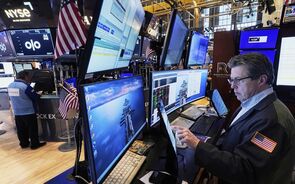A funny thing happened this week
1 Mensagem
|Página 1 de 1
A funny thing happened this week
A funny thing happened this week as Greenspan extended his 3-year sale on money: the cost of borrowing for most Americans suddenly shot up
June 29, 2003 -- AFTER months of anticipation, millions of Americans tuned in to HBO last Sunday for the season premiere of "Sex and the City."
But rather than watch the show's leadng character, Carrie Bradshaw, head to the opening of a hot new restaurant, Bradshaw (played by Sarah Jessica Parker) kicked off the season by ringing the opening bell at the New York Stock Exchange.
Flanked by (who else?) Exchange Chairman Dick Grasso, Bradshaw basks in the moment before tripping the bell with her perfectly manicured touch.
In the summer of 2003 the market for stocks, it seems, is sexier than the market for men or Manolos.
And that's just the way Alan Greenspan hopes it will stay.
That's because after 13 rate cuts, two big tax cuts and a concerted effort to drive down the value of the dollar, Sir Alan has now really backed himself into a corner.
He needs to convince the stock market that the economy is improving smartly while keeping the boys in the bond market from reaching the same conclusion.
And for the last couple of months that strategy worked nicely with the stock market going gangbusters at the same time bond yields cascaded to 45-year lows.
But a funny thing happened this week as Greenspan extended his 3-year sale on money: the cost of borrowing for most Americans suddenly shot up.
In fact, as the central bank cut its short-term funds rate to near depression-era lows, the yield on a 10-year note upon whichmortgages and other important loans are based actually shot up by 1/2 percent.
If the trend continues-watch out! A stampede out of bonds could put the Fed in a real catch-22.
Higher rates would not only make it even harder to justify buying stocks at 30 times earnings, it could cripple the refinancing craze- the main engine of the post-bubble economy.
Last year, refinancing activity put an extra $100 billion dollars in consumers' pockets and that pace has quickened in 2003, cushioning the economy from the drought in capital spending.
The Fed has found itself in this bind before but never at a time when American consumers have been so leveraged and hence, sensitive to higherrates.
In other words, Greenspan has to hope that rates stay low enough long enough until Corporate America can finally take over the heavy-lifting in the economy.
So far, Greenspan has managed this juggling act for two years and running, but like Carrie Bradshaw in her four-inch heels, he looks very close to losing his balance.
By: Terry Kienen
June 29, 2003 -- AFTER months of anticipation, millions of Americans tuned in to HBO last Sunday for the season premiere of "Sex and the City."
But rather than watch the show's leadng character, Carrie Bradshaw, head to the opening of a hot new restaurant, Bradshaw (played by Sarah Jessica Parker) kicked off the season by ringing the opening bell at the New York Stock Exchange.
Flanked by (who else?) Exchange Chairman Dick Grasso, Bradshaw basks in the moment before tripping the bell with her perfectly manicured touch.
In the summer of 2003 the market for stocks, it seems, is sexier than the market for men or Manolos.
And that's just the way Alan Greenspan hopes it will stay.
That's because after 13 rate cuts, two big tax cuts and a concerted effort to drive down the value of the dollar, Sir Alan has now really backed himself into a corner.
He needs to convince the stock market that the economy is improving smartly while keeping the boys in the bond market from reaching the same conclusion.
And for the last couple of months that strategy worked nicely with the stock market going gangbusters at the same time bond yields cascaded to 45-year lows.
But a funny thing happened this week as Greenspan extended his 3-year sale on money: the cost of borrowing for most Americans suddenly shot up.
In fact, as the central bank cut its short-term funds rate to near depression-era lows, the yield on a 10-year note upon whichmortgages and other important loans are based actually shot up by 1/2 percent.
If the trend continues-watch out! A stampede out of bonds could put the Fed in a real catch-22.
Higher rates would not only make it even harder to justify buying stocks at 30 times earnings, it could cripple the refinancing craze- the main engine of the post-bubble economy.
Last year, refinancing activity put an extra $100 billion dollars in consumers' pockets and that pace has quickened in 2003, cushioning the economy from the drought in capital spending.
The Fed has found itself in this bind before but never at a time when American consumers have been so leveraged and hence, sensitive to higherrates.
In other words, Greenspan has to hope that rates stay low enough long enough until Corporate America can finally take over the heavy-lifting in the economy.
So far, Greenspan has managed this juggling act for two years and running, but like Carrie Bradshaw in her four-inch heels, he looks very close to losing his balance.
By: Terry Kienen
Surfer
1 Mensagem
|Página 1 de 1
Quem está ligado:


